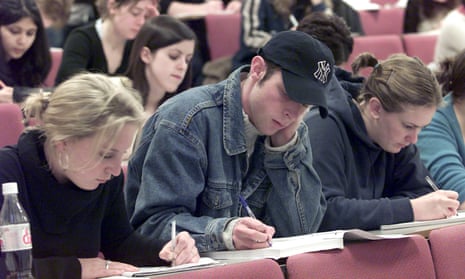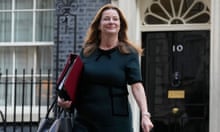University students in England are seeing less spent on their education than at any time since their tuition fees were tripled in 2012, according to new analysis by the Institute for Fiscal Studies.
According to the IFS, students are receiving even less than they were in 1990 as the government badly underestimated the effect of high inflation since it decided to freeze domestic undergraduate tuition fees at £9,250 – leading to a steep erosion in university teaching resources. “This does not seem a sensible way to set policy,” the thinktank’s annual report concluded.
By next year, the real-terms value of spending per student will have fallen back to the levels of 2011, when tuition fees were just £3,375 a year and the government contributed much more in teaching grants.
In 2012-13, each undergraduate from England had the equivalent of £11,800 spent annually on teaching resources. But undergraduates in 2024-25 will get just £9,600, according to the IFS.
“This will take it back to the same level as its low point in 2011, just before the increase in fees to £9,000 in 2012 – and, remarkably, 3% lower than in 1990,” the IFS said.
Kate Ogden, a senior research economist at the IFS, said universities in England were “definitely getting less for teaching home students than they used to”, thanks to inflation outstripping the government’s forecasts since the tuition freeze was applied.
The government’s forecasts in 2021 – when it extended the freeze for three years – implied that rising inflation would in effect cut spending on teaching by 6.5%. But the latest forecasts suggest that spending will be hit by twice as much: down by 13% between 2021-22 and 2024-25, equivalent to £1,370 less for each student.
The IFS’s calculations explain why universities in England are seeing a further wave of staff cuts and retrenchments, including department closures. Oxford Brookes University is among the latest to announce it is shutting maths and music courses, and applying cuts to other subjects.
Vivienne Stern, chief executive of Universities UK, which represents university leaders, said: “Universities currently incur an annual £1bn loss in teaching domestic students and an annual £5bn loss in their delivery of research.
“The trend of declining resource means that the current group of UK students has significantly less public resource devoted to their higher education than earlier generations, and risks compromising the quality of our teaching and research.
“We must reverse the long-term decline in funding for teaching, through increased government grants and index-linking the fee cap from 2025 onwards in England. To further support future students to have the same opportunities as those of the last decade, there must also be enhanced maintenance support, including reinstating maintenance grants for those who need them the most.”
Higher than expected inflation has also shrunk the value of maintenance support available for students. Students from England enrolling in 2024-25 will be entitled to borrow 11% less towards their living costs than they were in 2020–21, a cut equivalent to £107 a month for students from the poorest backgrounds.
In response, the Department for Education said: “Decisions on student finance have had to be taken to ensure the system remains financially sustainable.”
The IFS’s annual report on education spending in England found that the purchasing power of school budgets would be about 4% lower in 2024 than in 2010 once cost increases such as salary rises are taken into account.
Further education colleges and sixth forms are among the hardest hit, with spending per student in colleges in 2024 about 10% below 2010 levels, and 23% lower in school sixth forms.
The IFS also found that secondary schools in the most disadvantaged areas saw spending per pupil fall by 12% in real terms between 2010 and 2021, compared with a fall of 5% for schools in the most affluent areas.
Luke Sibieta, an author of the IFS report, said: “Rising inflation and costs are eroding the real-terms value of budgets across the early years, schools, colleges and universities alike. At the recent autumn statement, the government chose not to top up education spending plans, but instead focus on reducing taxes.”
A spokesperson for the DfE said: “This doesn’t tell the whole story. The IFS’s analysis on school spending patterns stops at 2021-22.
“We are taking the long-term decisions to improve our education system for generations to come by investing record funding into schools. Overall school funding is rising to its highest level in history, in real terms, next year – totalling £59.6bn.”









